LLP Structure in Singapore: Case Study on Business Law
VerifiedAdded on 2020/03/04
|6
|1168
|82
Case Study
AI Summary
This assignment provides a detailed analysis of Limited Liability Partnerships (LLPs) in Singapore, addressing the legal framework and business implications. The case study focuses on a scenario involving John, Tom, and Raj who are looking to establish a business while limiting their liability and maintaining control. The assignment explores the relevant sections of the Singapore Limited Liability Partnership Act 2005, including the definition of an LLP as a body corporate, perpetual succession, the capacity of an LLP, and the limitations on partner liability. The application section discusses how an LLP structure is the most suitable option for the individuals, allowing them to participate in day-to-day activities while limiting their liability to their capital contributions. The conclusion reinforces the recommendation of an LLP, and the document includes references to the relevant legislation and ACRA resources.

Running Head: Law 1
Law
Law
Paraphrase This Document
Need a fresh take? Get an instant paraphrase of this document with our AI Paraphraser
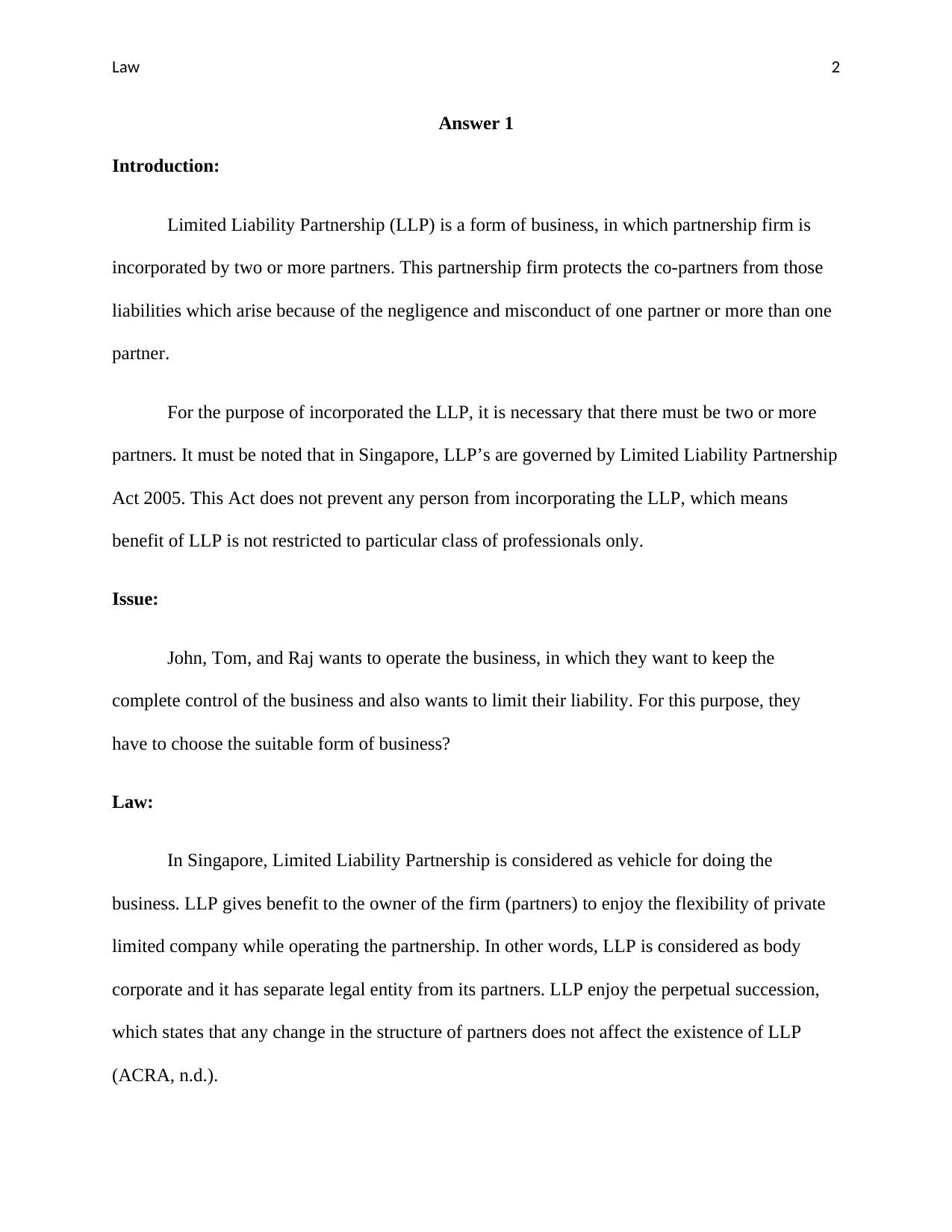
Law 2
Answer 1
Introduction:
Limited Liability Partnership (LLP) is a form of business, in which partnership firm is
incorporated by two or more partners. This partnership firm protects the co-partners from those
liabilities which arise because of the negligence and misconduct of one partner or more than one
partner.
For the purpose of incorporated the LLP, it is necessary that there must be two or more
partners. It must be noted that in Singapore, LLP’s are governed by Limited Liability Partnership
Act 2005. This Act does not prevent any person from incorporating the LLP, which means
benefit of LLP is not restricted to particular class of professionals only.
Issue:
John, Tom, and Raj wants to operate the business, in which they want to keep the
complete control of the business and also wants to limit their liability. For this purpose, they
have to choose the suitable form of business?
Law:
In Singapore, Limited Liability Partnership is considered as vehicle for doing the
business. LLP gives benefit to the owner of the firm (partners) to enjoy the flexibility of private
limited company while operating the partnership. In other words, LLP is considered as body
corporate and it has separate legal entity from its partners. LLP enjoy the perpetual succession,
which states that any change in the structure of partners does not affect the existence of LLP
(ACRA, n.d.).
Answer 1
Introduction:
Limited Liability Partnership (LLP) is a form of business, in which partnership firm is
incorporated by two or more partners. This partnership firm protects the co-partners from those
liabilities which arise because of the negligence and misconduct of one partner or more than one
partner.
For the purpose of incorporated the LLP, it is necessary that there must be two or more
partners. It must be noted that in Singapore, LLP’s are governed by Limited Liability Partnership
Act 2005. This Act does not prevent any person from incorporating the LLP, which means
benefit of LLP is not restricted to particular class of professionals only.
Issue:
John, Tom, and Raj wants to operate the business, in which they want to keep the
complete control of the business and also wants to limit their liability. For this purpose, they
have to choose the suitable form of business?
Law:
In Singapore, Limited Liability Partnership is considered as vehicle for doing the
business. LLP gives benefit to the owner of the firm (partners) to enjoy the flexibility of private
limited company while operating the partnership. In other words, LLP is considered as body
corporate and it has separate legal entity from its partners. LLP enjoy the perpetual succession,
which states that any change in the structure of partners does not affect the existence of LLP
(ACRA, n.d.).
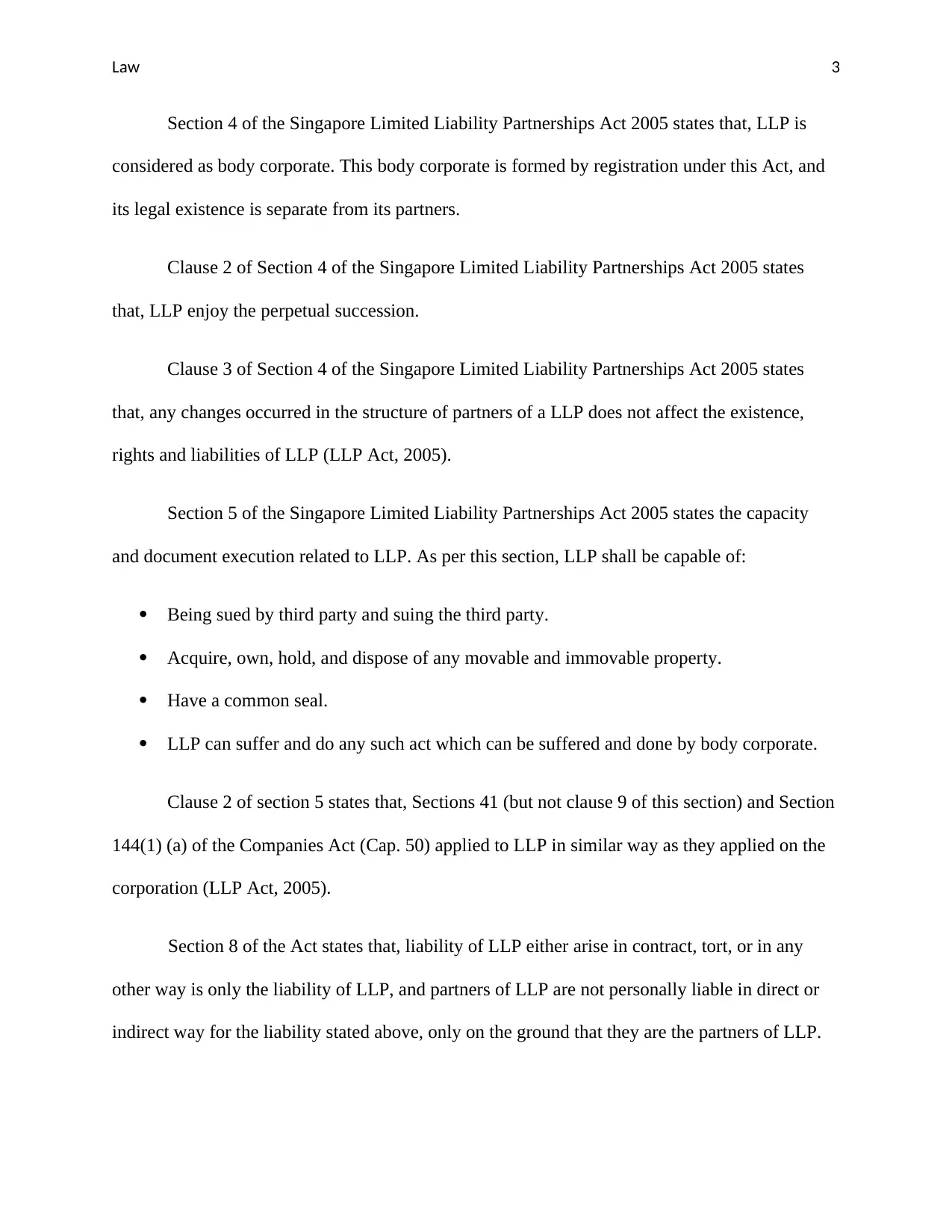
Law 3
Section 4 of the Singapore Limited Liability Partnerships Act 2005 states that, LLP is
considered as body corporate. This body corporate is formed by registration under this Act, and
its legal existence is separate from its partners.
Clause 2 of Section 4 of the Singapore Limited Liability Partnerships Act 2005 states
that, LLP enjoy the perpetual succession.
Clause 3 of Section 4 of the Singapore Limited Liability Partnerships Act 2005 states
that, any changes occurred in the structure of partners of a LLP does not affect the existence,
rights and liabilities of LLP (LLP Act, 2005).
Section 5 of the Singapore Limited Liability Partnerships Act 2005 states the capacity
and document execution related to LLP. As per this section, LLP shall be capable of:
Being sued by third party and suing the third party.
Acquire, own, hold, and dispose of any movable and immovable property.
Have a common seal.
LLP can suffer and do any such act which can be suffered and done by body corporate.
Clause 2 of section 5 states that, Sections 41 (but not clause 9 of this section) and Section
144(1) (a) of the Companies Act (Cap. 50) applied to LLP in similar way as they applied on the
corporation (LLP Act, 2005).
Section 8 of the Act states that, liability of LLP either arise in contract, tort, or in any
other way is only the liability of LLP, and partners of LLP are not personally liable in direct or
indirect way for the liability stated above, only on the ground that they are the partners of LLP.
Section 4 of the Singapore Limited Liability Partnerships Act 2005 states that, LLP is
considered as body corporate. This body corporate is formed by registration under this Act, and
its legal existence is separate from its partners.
Clause 2 of Section 4 of the Singapore Limited Liability Partnerships Act 2005 states
that, LLP enjoy the perpetual succession.
Clause 3 of Section 4 of the Singapore Limited Liability Partnerships Act 2005 states
that, any changes occurred in the structure of partners of a LLP does not affect the existence,
rights and liabilities of LLP (LLP Act, 2005).
Section 5 of the Singapore Limited Liability Partnerships Act 2005 states the capacity
and document execution related to LLP. As per this section, LLP shall be capable of:
Being sued by third party and suing the third party.
Acquire, own, hold, and dispose of any movable and immovable property.
Have a common seal.
LLP can suffer and do any such act which can be suffered and done by body corporate.
Clause 2 of section 5 states that, Sections 41 (but not clause 9 of this section) and Section
144(1) (a) of the Companies Act (Cap. 50) applied to LLP in similar way as they applied on the
corporation (LLP Act, 2005).
Section 8 of the Act states that, liability of LLP either arise in contract, tort, or in any
other way is only the liability of LLP, and partners of LLP are not personally liable in direct or
indirect way for the liability stated above, only on the ground that they are the partners of LLP.
⊘ This is a preview!⊘
Do you want full access?
Subscribe today to unlock all pages.

Trusted by 1+ million students worldwide
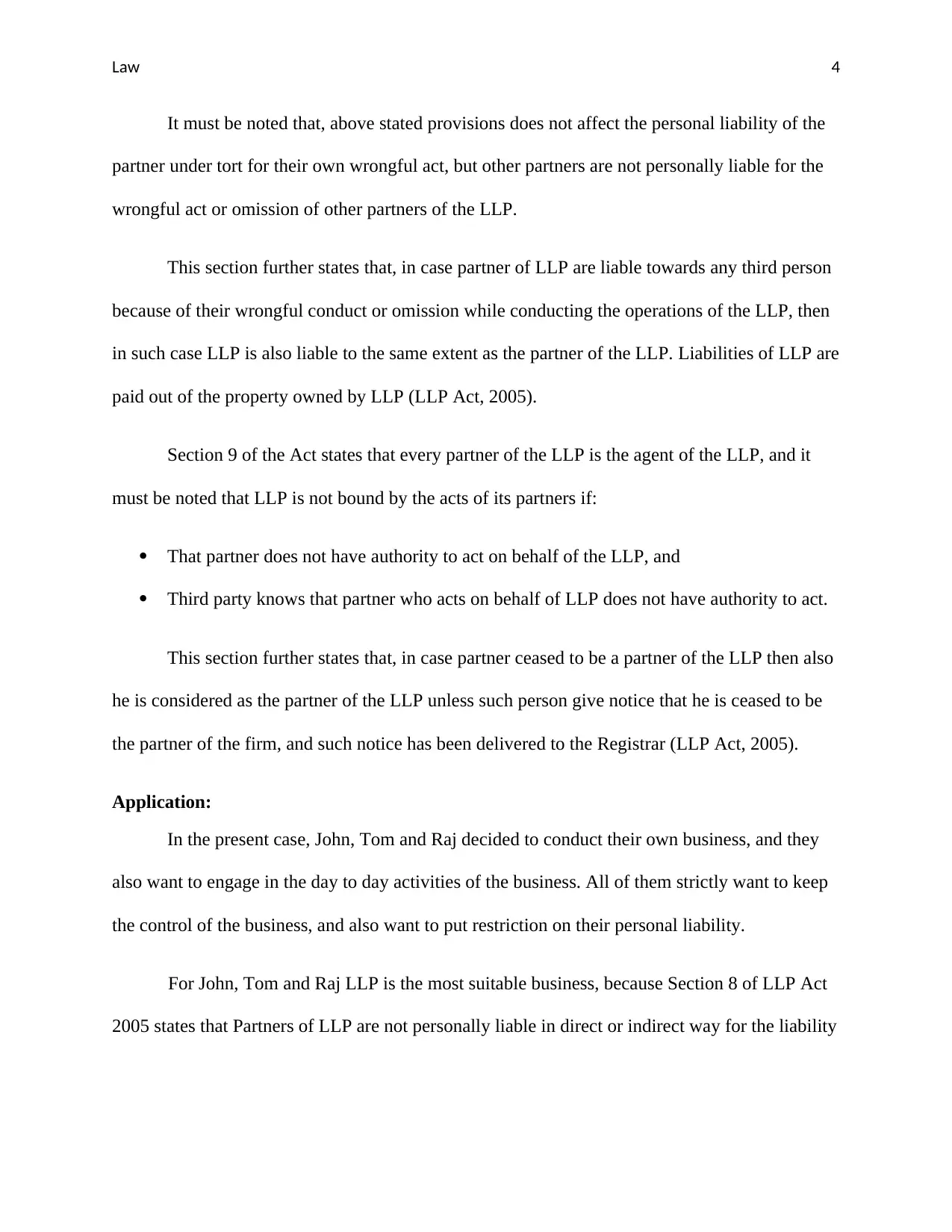
Law 4
It must be noted that, above stated provisions does not affect the personal liability of the
partner under tort for their own wrongful act, but other partners are not personally liable for the
wrongful act or omission of other partners of the LLP.
This section further states that, in case partner of LLP are liable towards any third person
because of their wrongful conduct or omission while conducting the operations of the LLP, then
in such case LLP is also liable to the same extent as the partner of the LLP. Liabilities of LLP are
paid out of the property owned by LLP (LLP Act, 2005).
Section 9 of the Act states that every partner of the LLP is the agent of the LLP, and it
must be noted that LLP is not bound by the acts of its partners if:
That partner does not have authority to act on behalf of the LLP, and
Third party knows that partner who acts on behalf of LLP does not have authority to act.
This section further states that, in case partner ceased to be a partner of the LLP then also
he is considered as the partner of the LLP unless such person give notice that he is ceased to be
the partner of the firm, and such notice has been delivered to the Registrar (LLP Act, 2005).
Application:
In the present case, John, Tom and Raj decided to conduct their own business, and they
also want to engage in the day to day activities of the business. All of them strictly want to keep
the control of the business, and also want to put restriction on their personal liability.
For John, Tom and Raj LLP is the most suitable business, because Section 8 of LLP Act
2005 states that Partners of LLP are not personally liable in direct or indirect way for the liability
It must be noted that, above stated provisions does not affect the personal liability of the
partner under tort for their own wrongful act, but other partners are not personally liable for the
wrongful act or omission of other partners of the LLP.
This section further states that, in case partner of LLP are liable towards any third person
because of their wrongful conduct or omission while conducting the operations of the LLP, then
in such case LLP is also liable to the same extent as the partner of the LLP. Liabilities of LLP are
paid out of the property owned by LLP (LLP Act, 2005).
Section 9 of the Act states that every partner of the LLP is the agent of the LLP, and it
must be noted that LLP is not bound by the acts of its partners if:
That partner does not have authority to act on behalf of the LLP, and
Third party knows that partner who acts on behalf of LLP does not have authority to act.
This section further states that, in case partner ceased to be a partner of the LLP then also
he is considered as the partner of the LLP unless such person give notice that he is ceased to be
the partner of the firm, and such notice has been delivered to the Registrar (LLP Act, 2005).
Application:
In the present case, John, Tom and Raj decided to conduct their own business, and they
also want to engage in the day to day activities of the business. All of them strictly want to keep
the control of the business, and also want to put restriction on their personal liability.
For John, Tom and Raj LLP is the most suitable business, because Section 8 of LLP Act
2005 states that Partners of LLP are not personally liable in direct or indirect way for the liability
Paraphrase This Document
Need a fresh take? Get an instant paraphrase of this document with our AI Paraphraser
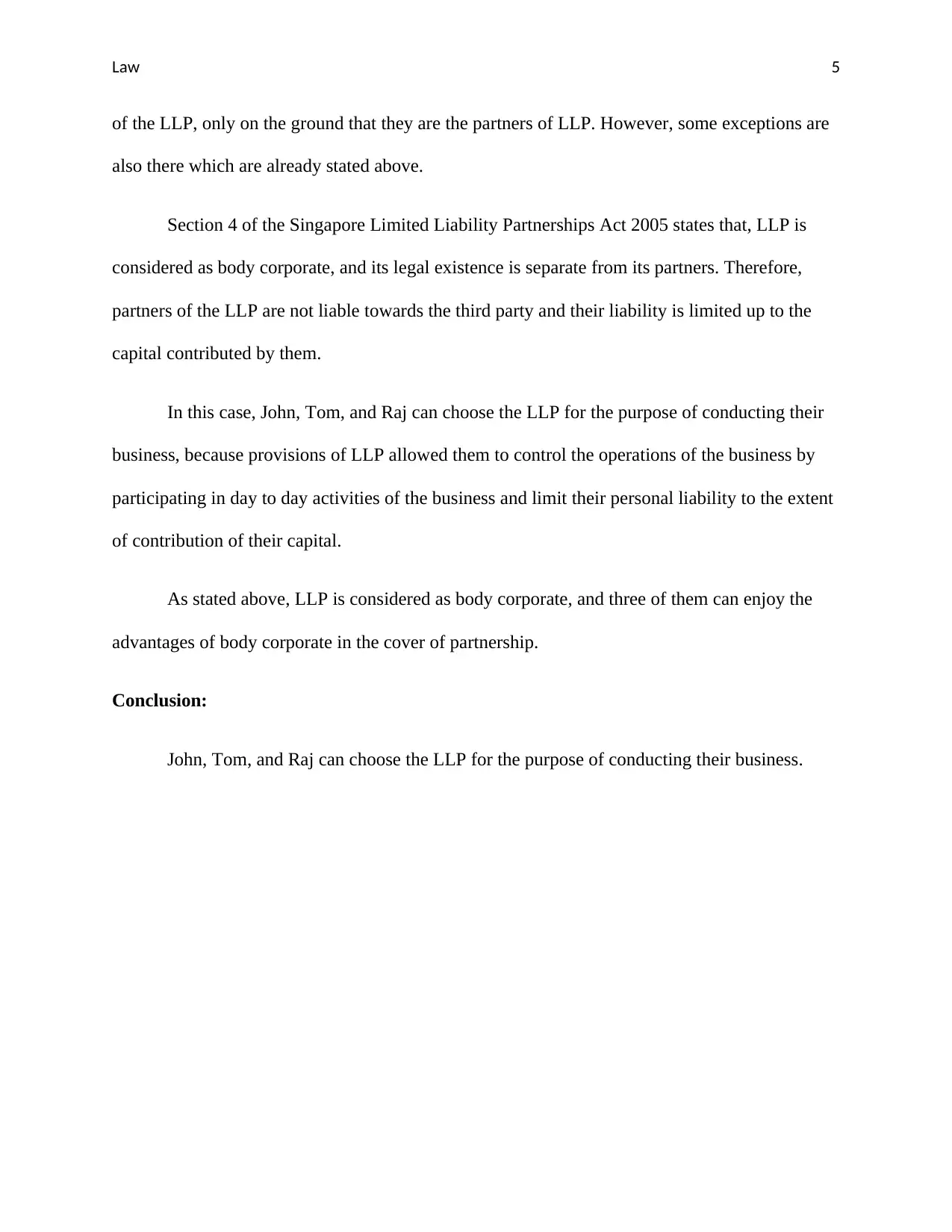
Law 5
of the LLP, only on the ground that they are the partners of LLP. However, some exceptions are
also there which are already stated above.
Section 4 of the Singapore Limited Liability Partnerships Act 2005 states that, LLP is
considered as body corporate, and its legal existence is separate from its partners. Therefore,
partners of the LLP are not liable towards the third party and their liability is limited up to the
capital contributed by them.
In this case, John, Tom, and Raj can choose the LLP for the purpose of conducting their
business, because provisions of LLP allowed them to control the operations of the business by
participating in day to day activities of the business and limit their personal liability to the extent
of contribution of their capital.
As stated above, LLP is considered as body corporate, and three of them can enjoy the
advantages of body corporate in the cover of partnership.
Conclusion:
John, Tom, and Raj can choose the LLP for the purpose of conducting their business.
of the LLP, only on the ground that they are the partners of LLP. However, some exceptions are
also there which are already stated above.
Section 4 of the Singapore Limited Liability Partnerships Act 2005 states that, LLP is
considered as body corporate, and its legal existence is separate from its partners. Therefore,
partners of the LLP are not liable towards the third party and their liability is limited up to the
capital contributed by them.
In this case, John, Tom, and Raj can choose the LLP for the purpose of conducting their
business, because provisions of LLP allowed them to control the operations of the business by
participating in day to day activities of the business and limit their personal liability to the extent
of contribution of their capital.
As stated above, LLP is considered as body corporate, and three of them can enjoy the
advantages of body corporate in the cover of partnership.
Conclusion:
John, Tom, and Raj can choose the LLP for the purpose of conducting their business.
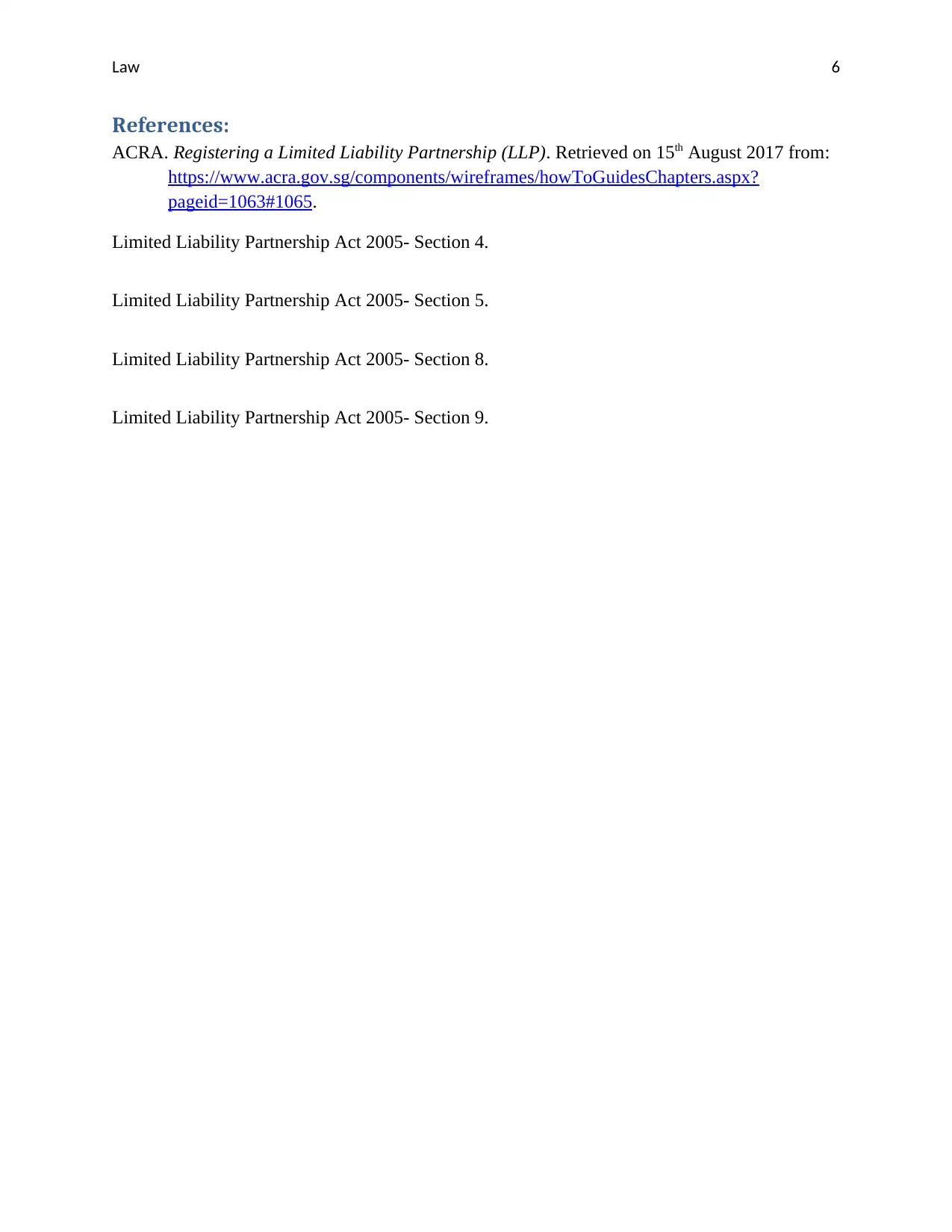
Law 6
References:
ACRA. Registering a Limited Liability Partnership (LLP). Retrieved on 15th August 2017 from:
https://www.acra.gov.sg/components/wireframes/howToGuidesChapters.aspx?
pageid=1063#1065.
Limited Liability Partnership Act 2005- Section 4.
Limited Liability Partnership Act 2005- Section 5.
Limited Liability Partnership Act 2005- Section 8.
Limited Liability Partnership Act 2005- Section 9.
References:
ACRA. Registering a Limited Liability Partnership (LLP). Retrieved on 15th August 2017 from:
https://www.acra.gov.sg/components/wireframes/howToGuidesChapters.aspx?
pageid=1063#1065.
Limited Liability Partnership Act 2005- Section 4.
Limited Liability Partnership Act 2005- Section 5.
Limited Liability Partnership Act 2005- Section 8.
Limited Liability Partnership Act 2005- Section 9.
⊘ This is a preview!⊘
Do you want full access?
Subscribe today to unlock all pages.

Trusted by 1+ million students worldwide
1 out of 6
Related Documents
Your All-in-One AI-Powered Toolkit for Academic Success.
+13062052269
info@desklib.com
Available 24*7 on WhatsApp / Email
![[object Object]](/_next/static/media/star-bottom.7253800d.svg)
Unlock your academic potential
Copyright © 2020–2026 A2Z Services. All Rights Reserved. Developed and managed by ZUCOL.





